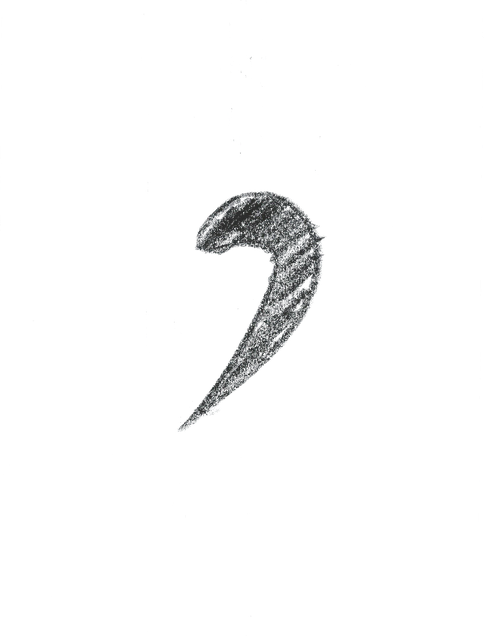If you haven’t yet listened to Nadia Bolz-Weber’s phenomenal podcast, The Confessional, I want to start out by recommending it. In the email she sent out announcing this week’s new episode, Pastor Nadia told a story from her own life and then reminded us of something I’ve heard before: It’s a mistake for any human being to put a period where God has placed a comma.*
I paused after reading that line—as I do every time I read it—and thought about the many times in my life when I’ve been convinced that things were over. That’s such a painful place to be. And although the fact that we can look back on those moments proves that they were not, in fact, the end of anything, that doesn’t erase the pain we felt. And it certainly doesn’t make that moment any less significant in shaping our lives.
I thought, for instance, about the spring of 1983, when I got engaged to a boy I had dated on and off in high school. (I had graduated in May of 1982, which means I was a freshman in college at this point.) We were not a good match. His friends knew that, my friends knew that, my family certainly knew that. But, like most 19-year-olds, I was convinced that I knew better: I could love him into being the person I needed him to be. The most important thing was that someone loved me enough to propose marriage. Therefore, I must be worthy of being loved. Forever, no less.
That engagement didn’t last more than a couple of months. I remember very specifically the night it ended: I’d settled down to study for a French test, but I couldn’t concentrate at all. And then God very clearly said Just get up. You know you need to end this. I hadn’t been thinking about calling off my engagement that night, but all at once I knew this was, in fact, the only thing I would be doing. The French test would have to wait.
So my engagement ended–but the story of my engagement didn’t. Remember when you got engaged your freshman year? That was so ridiculous! You must be so embarrassed every time you think about it. I wasn’t yet at a point where I realized that the people who shame you for their own amusement don’t actually care about you, even if they claim to be your friends. Not even if they happen to be your family. Usually I just laughed along. What was I thinking, wanting to feel worthy of someone’s eternal devotion? How ridiculous.
But there have been times when something was absolutely over and done with. Like when I miscarried my first pregnancy, and the various plans I’d started to make just turned to dust. That baby would not be born in May. Would I get pregnant again? Would I ever have a child? I didn’t know. What I did know, for certain, was that something had come to an end.
I did go on to have a child. (Two, actually.) But if I hadn’t, I know my life still would have moved forward–just in some other direction.
Which leads me back to 1983, to the memory of a girl I met in college. I’ll call her Dana. She discovered she was pregnant in the fall of our sophomore year.
Dana was the sort of girl who could quote an appropriate Bible verse for every occasion. The sort of girl who went to church every Sunday, even while living away from home—something neither I nor any of my friends did. Most of us were too way hung over on Sunday morning to even sit up straight, much less go to church. But Dana got pregnant, so she married her boyfriend just before Christmas, and their baby was born the following spring.
And then, a few months later, the baby died. I don’t remember how I heard this news or what happened to their child. I didn’t know Dana well enough to ask that kind of question.
The baby died, and then Dana’s husband moved out, so her marriage was over too. Everything that had become her life just . . . ended.
I saw Dana again two years later, at our college graduation. I was stunned to see her in a cap and gown, because–well, really? You have a child, you lose that child, you lose a marriage, and still you graduate from college in four years? It was unimaginable to me, the kind of faith it must have taken just to keep moving forward, trusting that good things were ahead.
But that’s exactly what she had done. She’d lost a whole life, then kept moving forward.
Sometimes I think about Dana and the shame I know she felt. There have been so many moments when my shame felt all-consuming, when I didn’t know how I was going to walk out my front door ever again. But shame never once changed my life. Only love did that.
Maybe the decision to be loving is its own kind of comma–maybe it creates the moment when you can pause to consider what’s happened so far while still believing that you’re not done yet. And maybe the reason you keep moving forward is that you know there’s more to the story than just this. You trust that, however the story unfolds, it’s going to be good.
Whether you think of that kind of love as something that comes from God, from the people around you, from inside yourself–or, maybe, all of the above—that comma simply connects what came before and what comes next. It never limits what the rest of the sentence can say.
*Pastor Nadia didn’t know the original source for his quote. I did some research, but I can’t find it either. If you know, pass along that information so I can add it to this post.





No Comments